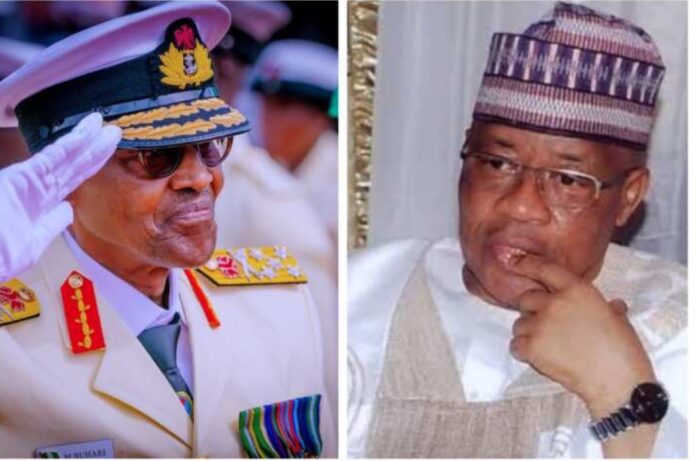Between IBB Military Government and Buhari Civilian Administration
By Adnan Mukhtar
Like most young Nigerians, we were not born when General Ibrahim Babangida as military president ruled Nigeria between 1984 to 1993 after he overthrew a previous military regime.of General Muhammadu Buhari.
Buhari was later elected in 2015 and reelected for another term of four years that ended in May 2023.
I am amazed by the outpouring goodwill on IBB on his 82nd birthday where he was described as a pacesetter of Nigeria’s infrastructural development.
I can say that the Buhari’s civilian government saw the most ambitious programmes, legislative reforms and infrastructural development in the country.
It is also public knowledge that Buhari signed a series of bills into law for the benefit of Nigerians. They include: 16 Constitution Amendment Bills; Business Facilitation Act, 2022; Electoral Act (Amendment) 2022; Defence Research and Development Bureau Act, 2022; Terrorism (Prevention and Prohibition) Act, 2022, which repeals the Terrorism (Prevention) Act, 2011 as amended in 2013, and provides for the effective implementation of international instruments on the prevention and combating of terrorism and suppression of the financing of terrorism etc.
As with legislative reforms, Buhari’s administration established the Infrastructure Corporation of Nigeria (InfraCorp); the Nigerian Sovereign Investment Authority (NSIA) and the Africa Finance Corporation (AFC).
On Rail Transportation, Buhari constructed the 156km Lagos-Ibadan Standard Gauge;
8.72km extension to Lagos-Ibadan Rail Line, to Lagos Port Complex; completed186km Abuja-Kaduna Standard Gauge Rail Line; Completed 327km Itakpe-Warri Standard Gauge Rail.
Similarly, Buhari also achieved a lot in Digital Economy with record-setting contributions to GDP. In the first quarter of 2020, for instance, ICT singlehandedly (without digital services) contributed 14.07 per cent of Nigeria’s GDP, topping this in the second quarter of 2021, with a 17.92 per cent contribution to GDP and again topping this in the second quarter of 2022 with 18.44 per cent.
The administration also launched new national 5G policy in 2021, and successful licensing of two private companies to rollout 5G nationally. The 5G spectrum auction generated over $500 million in license fees before it was rollout commenced in August 2022.
President Buhari also constructed state-of-the-art and well-fortified Prison in Kano known as Janguza Correctional Centre to serve the people of the city and other states of the federation.
Read Also:
Meanwhile, in his 8 years as military president, Babangida distinguished himself as an astute administrator and bridge builder. As an indigene of Kano, I was not aware, until.recently to learnt that Babangida was behind the establishment of one of the biggest health facility in the state, Aminu Kano Teaching Hospital affliated to Bayero University Kano.
I was also told that IBB expanded the roads from Kano to Kaduna and Abuja and many bridges in Lagos and elsewhere, he also introduced mass housing projects in most states.
As he built military barracks in Abuja, IBB also established the National Intelligence Agency (NIA), fashioned after the American CIA; the Department of State Security (DSS) which is as good as the FBI; and the Defence Intelligence Agency (DIA).
General Babangida completed the Shiroro Hydroelectric Power Station in Niger, constructed Toja Bridge in Kebbi and created the Jibia Water Treatment Plant in Katsina and Challawa Tiga Dam in Kano.
In fact I was shocked to discover that ECOWAS Secretariat, International Conference Centre Abuja and FHA Estates across the federation were constructed by him.
He also created 10 states namely: Yobe, Katsina, Taraba Jigawa, Kebbi, Enugu, Edo, Delta, Osun and Akwa Ibom States.
The General Babangida-led government provided uncommon support to the education sector, with vibrant policies that allowed both the public and private sectors to fully participate in the running of education. Today, private schools contribute significantly to education development at all levels in Nigeria.
In addition, he established the National Primary Education Commission, Nigerian Educational Research and Development Council, National Primary Education Commission, National Commission for Nomadic Education, National Commission for Mass Literacy, Adult and Non-formal Education, Federal School of Surveying, National Agency for Science and Engineering Infrastructure among others, all of which helped in the revitalization of the education sector.
IBB also introduced the Federal Road Safety Corps (FRSC) in 1988 to lessen the overburdened or overstretched police which had too many tasks that probably distracted them from the core duty of fighting crime. The Federal Road Safety Corps was introduced to take from the police the responsibility of road safety.
General Babangida also left an indelible mark in the media sector by breaking the monopoly of state ownership, especially in the broadcast industry when he deregulated the sector in 1992 and established the National Broadcasting Commission (NBC) as the regulator. That decision has engendered private sector participation in the broadcast industry.
While this article is in a series, if I may ask, between two leaders, Ibrahim Badamasi Babangida’s Military Government and Muhammadu Buhari’s Civilian Administration who brought rapid transformational changes to Nigeria?
Adnan Mukhtar writes from Kano
















